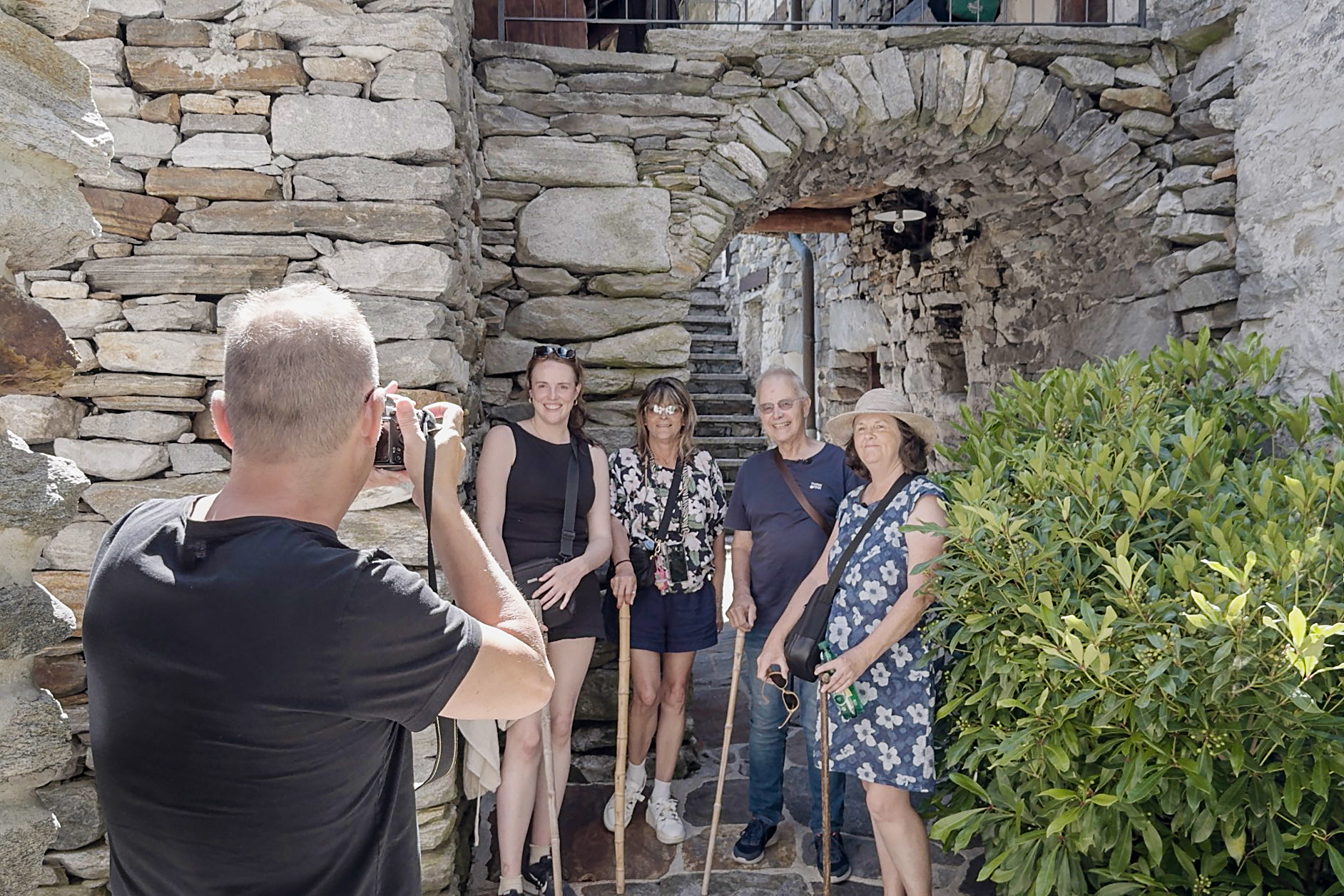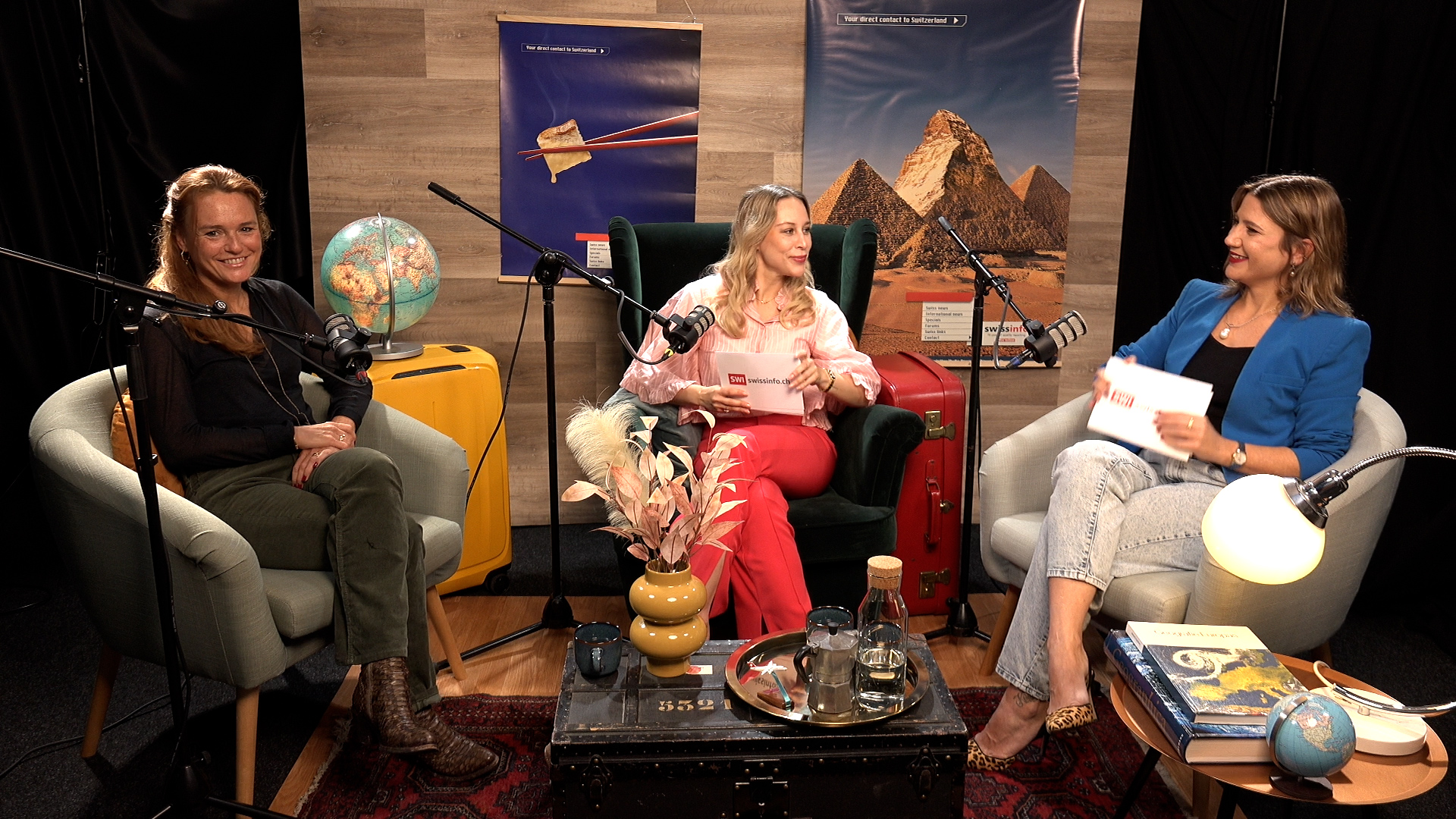
Australian descendants of Swiss emigrants untangle their origins

This summer an Australian family visited southern Switzerland, where their ancestors lived before emigrating Down Under to escape the economic crisis of the 19th century. Meeting distant relatives to compare genealogical research allowed them to fill the gaps in their family tree.
Juliette Buchanan is closing the circle. Along with her daughter and her cousin, she makes her way along the narrow lanes of the “Cioss” neighbourhood in Gerra Verzasca, a tiny village in the Verzasca Valley in southern Switzerland. This is presumably where her great-great-grandfather Antonio Vosti once lived, before emigrating to Australia in 1859.
Remo Vosti, Juliette’s eighth cousin (they share a common ancestor from eight generations ago) is guiding the group, pointing out references to their family as they walk between the rustici – Ticino’s typical stone houses – where the Vosti resided. The name is inscribed on an old wood oven and on an ex-voto on the side of a house.
The Vosti then start climbing up the sunny hill towards a small group of stone houses of which only one still stands, serving as a stable for sheep, its roof intact. Around it, piles of rocks trace the perimeter of the others who didn’t stand the test of time. This is where their earliest documented ancestor Agustus once lived.
Travelling for the first time from Australia to Gerra Verzasca, Juliette hopes to find answers about her incomplete family tree.
Hunting for clues through public records
Juliette’s grandmother Madge – Antonio’s granddaughter – didn’t know she was Swiss: she was an illegitimate offspring who grew up a foster child, and never managed to get hold of her birth certificate. “She knew herself as Voste with an ‘e’ on the end, but when she got married in 1926 and requested her birth certificate, nothing came up,” explains Juliette.
Having caught the bug of genealogical research in her twenties, as she put it, Juliette decided to look for her grandmother in the birth indexes, going through the publicly accessible microfilm records of the Mormon Church. “One of the ladies that was helping me suggested to search for ‘Vost’ without the end letter. And finally Madge’s name came up, with her last name misspelt as Vostor.”
After researching public records in Australia, Juliette went onto Ancestry, one of the many websites where people can compile their family tree, to look for more clues. Finally, to confirm her bloodline she decided to do a DNA test. “All these Vosti came up as links to me through the DNA as cousins, second cousins, which confirmed all my research.”
But the tree still had lots of missing names and dates, so when Juliette planned her trip to Switzerland, she got in touch with the Ticino genealogical society, hoping they could provide some answers. They did better than that: they put her in touch with her distant relatives, who welcomed their Australian cousins with open arms.
Emigrating from Ticino in the 1800s
As historian Giorgio Cheda explained in a previous interview with Swissinfo, during the economic crisis of the mid-19th century, many people left the poor valleys of Ticino, southern Switzerland, heading to Australia and California. Between 1853 and 1855 alone, some 2,000 Ticinesi set sail for Australia, mainly young men from the Verzasca and Maggia valleys, as well as from the Locarno area.
At the time, Ticino was the only canton that didn’t have any law to regulate the activities of emigration agencies, which advertised a promised land at a very expensive price. Emigrants had to take out loans and mortgages to travel to Australia, which had to be paid back by relatives in case they died before arriving.
Many of those who made it never returned to their homeland, building a family and a life oversea. But they never forgot where they came from, as a dedicated tombstone on Gerra Verzasca’s cemetery entrance testifies.
Edited by Samuel Jaberg/ts/ac

In compliance with the JTI standards
More: SWI swissinfo.ch certified by the Journalism Trust Initiative








































You can find an overview of ongoing debates with our journalists here . Please join us!
If you want to start a conversation about a topic raised in this article or want to report factual errors, email us at english@swissinfo.ch.